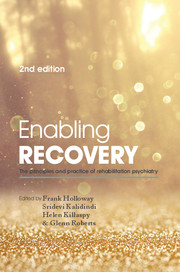Book contents
- Frontmatter
- Contents
- List of contributors
- List of figures, tables and boxes
- Preface
- Part 1 Setting the scene
- 1 Rehabilitation in a historical context
- 2 What is psychiatric rehabilitation?
- 3 Rehabilitation as a values-led practice: the contribution of recovery, social inclusion and personalisation
- 4 A comprehensive approach to assessment in rehabilitation settings
- 5 Understanding madness: a psychosocial perspective
- 6 First-person narratives
- Part 2 Treatment approaches
- Part 3 Key elements of a rehabilitation service
- Part 4 Special topics in psychiatric rehabilitation
- Part 5 Future directions
- Index
5 - Understanding madness: a psychosocial perspective
from Part 1 - Setting the scene
Published online by Cambridge University Press: 02 January 2018
- Frontmatter
- Contents
- List of contributors
- List of figures, tables and boxes
- Preface
- Part 1 Setting the scene
- 1 Rehabilitation in a historical context
- 2 What is psychiatric rehabilitation?
- 3 Rehabilitation as a values-led practice: the contribution of recovery, social inclusion and personalisation
- 4 A comprehensive approach to assessment in rehabilitation settings
- 5 Understanding madness: a psychosocial perspective
- 6 First-person narratives
- Part 2 Treatment approaches
- Part 3 Key elements of a rehabilitation service
- Part 4 Special topics in psychiatric rehabilitation
- Part 5 Future directions
- Index
Summary
Much madness is divinest sense to a discerning eye.
Emily Dickinson, 1890Introduction
Understanding madness may at first seem a futile prospect, for psychosis, madness, has historically been defined as ‘un-understandable’ and can appear bizarre, confusing or completely unintelligible to those encountering it from the outside. We disagree, and we are not alone, for there is historical precedent and current interest in reconsidering how to understand both the occurrence of psychosis and the link between psychotic symptoms and people's life experiences.
There has been a historical division of understanding between the now dominant biomedical approach, which understands madness as an illness with essentially meaningless symptoms, and psychosocial perspectives, which understand madness, in both form and content, as a personal reaction, meaningfully related to life experience. In the equivalent chapter in the first edition of this book, one of us (G.R.) offered a potential bridge across this divide, through suggesting that the contents of many symptoms of madness may arise from people's attempts to ascribe meaning to a confusing psycho-physiological process. In revisiting the chapter together, we have agreed to offer a psychosocial perspective, reviewing some of the related theory and evidence that have become available since the first edition was published in 2006. Our different backgrounds and training have led to us wanting to give greater or lesser emphasis to the possible causal role of life events and we will reflect on how our understanding of causes has implications for the relationships we establish in therapeutic settings and the nature of and rationale for our treatments. Nonetheless, we share the previous conclusion: that a collaborative search for meaning can be ‘antipsychotic’, by fostering trusting, compassionate and thus healing relationships with people to whom it could otherwise be difficult to relate. Our argument constitutes a balancing rather than balanced contribution; it aims for an expectation and appreciation of meaningfulness in our work as a foundation for helpful relationships with people travelling through this profound experience, in support of their recovery.
- Type
- Chapter
- Information
- Enabling Recovery , pp. 79 - 98Publisher: Royal College of PsychiatristsPrint publication year: 2015



